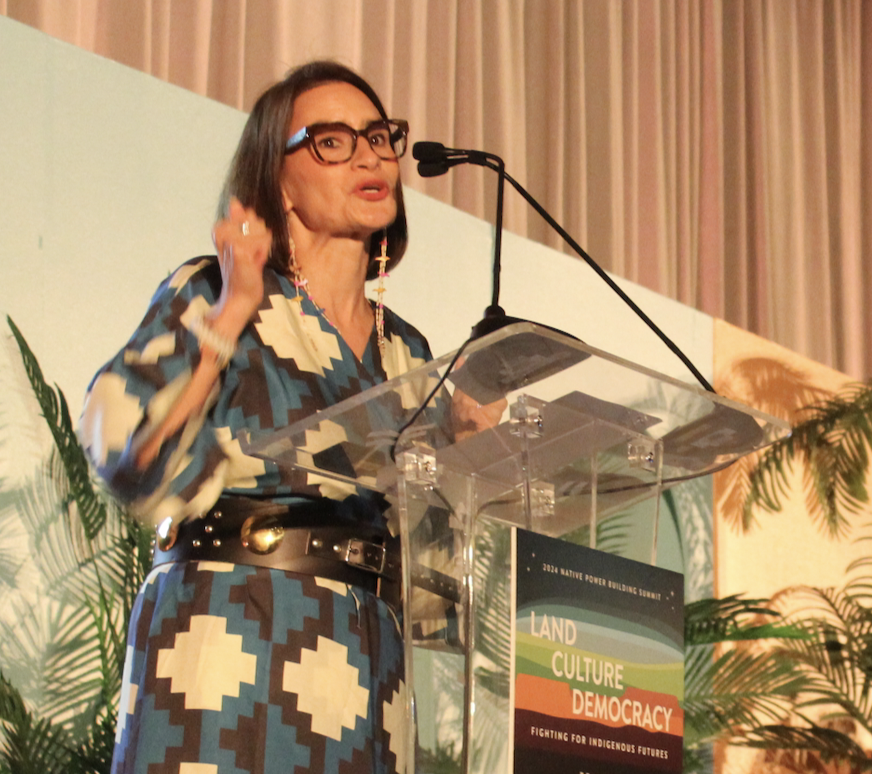
- Details
- By Levi Rickert and Neely Bardwell
Native Vote 2024. Lt. Governor Peggy Flanagan (White Earth Ojibwe) could become governor of Minnesota in January 2025. If it happens, Flanagan would become the first Native American female governor of a state.
This scenario could play out if Vice President Kamala Harris, the presumptive Democratic nominee selects Minnesota Governor Tim Walz to be her running mate and they get elected in November.
Walz, who is in his second term as governor, is reportedly on Vice President Harris’ short list of those under consideration for the second most powerful job in the federal government.
Walz made national news when he said about Donald Trump and J.D.Vance “these guys are just weird” while speaking to a crowd of canvassers for the Harris campaign in St. Paul, Minnesota on Saturday.
The word stuck. Even Vice President Harris used the words “just plain weird” describing the Republican ticket.
Vice President Harris will make her decision early this month. The Harris for President campaign announced on Wednesday, she and her running mate will embark on a campaign blitz making stops in battleground states. The tour begins in Philadelphia, Pennsylvania on Tuesday, August 6th. The tour will stop in Eau Claire, Wisconsin and Detroit, Michigan on Wednesday; Research Triangle, North Carolina on Thursday; Savannah, Georgia and Phoenix, Arizona on Friday and will end in Las Vegas, Nevada on Saturday.
Walz would make an attractive running mate who could provide balance to a ticket with Harris, who is a former prosecutor from blue state California. Walz, 60, taught high school social studies for two decades before he decided to enter politics. Prior to being elected governor, Walz served in Congress for six terms. He represented a rural congressional district.
Peggy Flanagan is Minnesota’s 50th lieutenant governor, a citizen of the White Earth Band of Ojibwe, and currently the country’s highest ranking Native woman elected to executive office. As lieutenant governor, Flanagan co-chairs the work of the Young Women’s Initiative to center the voices of young women in the work of state government. She also works to address homelessness as the chair of the Minnesota Interagency Council on Homelessness.
She also serves as chair of the Capitol Area Architectural and Planning Board (CAAPB) and chair of the Advisory Committee on Capitol Area Security (ACCAS).
Flanagan earned her bachelor’s degree in American Indian studies and child psychology in 2002 from the University of Minnesota. She then went on to serve on the Minneapolis Board of Education from 2005 to 2009. Not long after, she started working at Wellstone Action, the organization founded to carry on the work of the late Senator Paul Wellstone, for nearly a decade. As one of the original trainers of Wellstone Action’s signature program Camp Wellstone, she trained thousands of organizers, elected officials, and candidates including the now Governor Walz.
Following her work at Wellstone Action, Flanagan served as the executive director of Children’s Defense Fund - Minnesota, a non-profit child-advocacy organization working to level the playing field for all children in our state.
It wasn't until 2015, Flanagan was elected to the Minnesota House of Representatives to serve her home community of St. Louis Park, as well as Golden Valley, Plymouth, and Medicine Lake. She served as the DFL lead on the Subcommittee on Child Care Access and Affordability. In 2017 she collaboratively formed the state’s first People of Color and Indigenous Caucus which works to improve the education, health, and economic opportunities of people of color and Indigenous communities across the state.
Flanagan was elected lieutenant governor in 2018. The Walz-Flanagan administration was reelected in 2022.
Flanagan served as the Minnesota Democratic–Farmer–Labor Party (DFL) lead on the subcommittee on Child Care Access and Affordability.
In 2017, she joined her DFL legislative colleagues to form the state’s first POCI (People of Color and Indigenous) Caucus. Together, the caucus works to improve the education, health, and economic opportunities of people of color and Indigenous communities across the state.
As the Minnesota lieutenant governor, Flanagan is currently the top state elected female in the country. She serves as the chair of the Democratic Lieutenant Governors Association at the same time that Walz is chair of the Democratic Governors Association.
Last week in Phoenix, Flanagan hosted the first Native American campaign event for the Harris for President campaign only one day after President Biden announced he would drop out of the presidential race and promptly threw his support around Harris.
Back in Minnesota, later in the week while being introduced, Minnesota House Speaker Melissa Hortman said:
“It’s my honor to turn the podium over to someone who might become the first female governor of the state of Minnesota, depending on how those veepstakes go,” Hortman said when she was referring to reports Vice President Harris was considering Walz as a potential running mate.
“Thank you madam Speaker,” Flanagan said. “One. Thing. At a time.”
Help us defend tribal sovereignty.
At Native News Online, our mission is rooted in telling the stories that strengthen sovereignty and uplift Indigenous voices — not just at year’s end, but every single day.
Because of your generosity last year, we were able to keep our reporters on the ground in tribal communities, at national gatherings and in the halls of Congress — covering the issues that matter most to Indian Country: sovereignty, culture, education, health and economic opportunity.
That support sustained us through a tough year in 2025. Now, as we look to the year ahead, we need your help right now to ensure warrior journalism remains strong — reporting that defends tribal sovereignty, amplifies Native truth, and holds power accountable.
 The stakes couldn't be higher. Your support keeps Native voices heard, Native stories told and Native sovereignty defended.
The stakes couldn't be higher. Your support keeps Native voices heard, Native stories told and Native sovereignty defended.
Stand with Warrior Journalism today.
Levi Rickert (Potawatomi), Editor & Publisher
